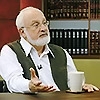 Question: During the Enlightenment, many Jews moved to cities. 70 to 80% of them were engaged in trade, worked in factories, enrolled in universities, served in the army, and created their own parties. There was a departure from religion.
Question: During the Enlightenment, many Jews moved to cities. 70 to 80% of them were engaged in trade, worked in factories, enrolled in universities, served in the army, and created their own parties. There was a departure from religion.
Jews participated everywhere, even in the most anti-Semitic organizations. Among them were Mensheviks, Socialist-Revolutionaries, Bolsheviks, and even Black Hundreds.
A new division appeared, a religious one, which became one block, and the part that left religion. Why, from the point of view of the purpose of creation is such a withdrawal from the spiritual roots of the majority of Jews?
Answer: Neither Hasidim nor the Litvaks [Lithuanian Jews] suited people who needed a clear methodology. What is religion for? Where does it lead? What is its purpose, its meaning? Why is it given to the Jewish people?
This is a natural set of questions that arise among Jews who have gone through such long exiles, who emerged from the Middle Ages surrounded by other peoples, who also began to catch up, develop science, open universities, etc.
In addition, a vision about the Jewish masses was created as being completely intimidated, ignorant, very far from the modern, constantly developing world. Therefore, there was a very serious difference between the progressive Jewish strata who went into science, art, and those who remained in the Jewish villages, in their yeshivas [Jewish educational institutions devoted to Talmudic study].
Question: But from the point of view of spiritual development is it good that people leave their history and forget everything?
Answer: This story has outlived its usefulness since it existed on the ruins of the destroyed Temple. It had no opportunity to continue further. There is a time to scatter stones and a time to collect them.
But to this day, echoes of that period are felt, although in our time not so much because the leaders of the religious part of the people realized that something had to be done, to somehow develop further.
Therefore, in recent years, they no longer alienate people from approaching science, from acquiring normal occupations.
Earlier, if a person wanted to live a religious life, he condemned himself to a beggarly existence without a normal profession. His family lived on a level lower than the rest of the Jews that were engaged in civilian practices.
Therefore, having received the rights, the Jews rushed to the cities, to factories. When the Bolsheviks came to power, Jews became the bulk of the leadership in all parties and organizations. Not only men, but also women. Paradoxically, most of the Soviet leaders had Jewish wives.
For more on this topic, read my book The Jewish Choice: Unity or Anti-Semitism, Historical facts on anti-Semitism as a reflection of Jewish social discord.
[270069]
From KabTV’s “Systematic Analysis of the Development of the People of Israel” 12/28/19
From KabTV’s “Systematic Analysis of the Development of the People of Israel” 12/28/19

No comments:
Post a Comment